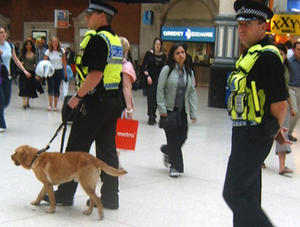Transportation securityTSA wants more bomb-sniffing dogs to protect air, ground travelers
The Transportation Security Administration (TSA) wants to increase the role dogs play in sniffing out terror threats at U.S. airports and other mass transit systems; TSA requested $71 million from Congress to train and deploy 275 explosives detection canine teams — bomb dogs and their handlers — at transportation facilities

TSA wants to expand the use of exlosive detection canines such as these in Victoria station // Source: wired.com
The Transportation Security Administration (TSA) wants to increase the role dogs play in sniffing out terror threats at U.S. airports and other mass transit systems. TSA requested $71 million from Congress to train and deploy 275 explosives detection canine teams — bomb dogs and their handlers — at transportation facilities. The Pittsburgh Tribune-Review’s Tom Fontaine writes that the agency has 700 teams, including five at Pittsburgh International Airport.
“The teams have proven to be a very reliable, effective and flexible layer of security,” said TSA spokeswoman Ann Davis. Davis could not say whether Pittsburgh International would be in line for more dogs if the agency gets the money.
Allegheny County police have maintained airport bomb dogs since 1973. Since 9/11, however, TSA has supplied them and covered many related expenses, providing as much as $50,000 a year per dog to county police, Davis said.
Most work done by airport bomb dogs goes unnoticed, occurring out of sight to passengers in security-checkpoint lines and terminals, county police say. The dogs spend much of their time looking for trouble in restricted cargo and baggage areas, empty parking lots and remote areas of airport property.
“Public visibility plays a role, but it’s what you don’t see or know (the dogs do) that really makes airports safer,” said county police Officer Mark McConnell, a handler since 1994 whose Belgian malinois, Rudy, has worked at the airport for five years.
Fontaine writes that this year, however, some bomb dogs gained visibility for the wrong reasons. Three dogs at Philadelphia International Airport made headlines when they flunked recertification tests, prompting Representative Robert Brady (D-Philadelphia) to demand immediate replacements. Authorities at Minneapolis-St. Paul International evacuated a baggage-claim area for ninety minutes after a bomb dog mistakenly alerted officials to a bag that authorities later determined contained no explosives.
McConnell understands the scrutiny. Beyond the high stakes of securing airports, he said “if a dog has a lot of false positives, you can cost the airline a ton of money and cause delays for a lot of people.”
McConnell said Pittsburgh International’s dogs and handlers — assigned to each other by the TSA — go through ten weeks of training at Lackland Air Force Base in San Antonio. When asked how many explosive odors they are trained to detect, he said, “That’s a federal secret.”
Visiting TSA trainers evaluate the dogs annually. In one test, McConnell said, a trainer hides an item laced
